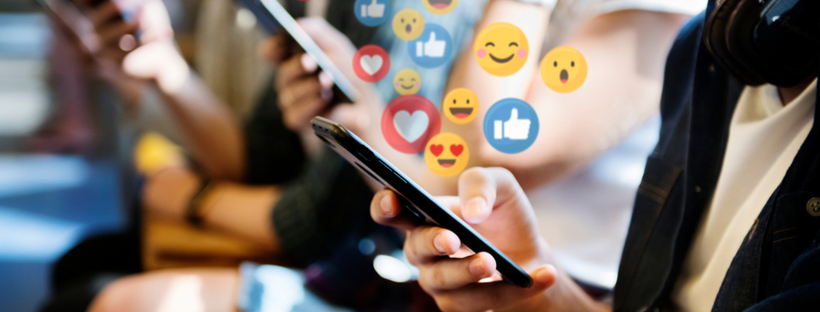Social Media and Mental Health: What’s the Impact?
The Nystrom & Associates provider consulted for this article is Jon Kirby, LMFT, Clinical Site Director, Outpatient Therapist.
Social media is a great tool to connect with others and share our lives with friends and family. But does it have a downside? To help answer this question, we recruited Jon Kirby, Clinic Director and Outpatient Therapist at Nystrom & Associates.
Related: How to Make Friends as an Adult
Social Media and Mental Health
While social media can be useful, it’s not when it’s our only form of meaningful connections. “When we’re maintaining strong, deep-rooted social connections offline, social media can be a useful supplement when used in moderation. However, what we’re seeing in the research is social media also has the potential for harmful effects such as increasing feelings of anxiety, depression, and loneliness—particularly when social media becomes the only form of social connection.” Related: Breathing Exercises for Anxiety & Stress Kids in particular are vulnerable to the dark side of social media. “This is especially true for middle school and high school-aged students who are going through a critical stage of identity development,” Kirby says. “Just like with most things in life, the key here is moderation.”The Effects of Social Media
Social media is still relatively new in the research space - Myspace was created in 2003, Facebook in 2004, and Twitter in 2006 – so, there’s not quite enough concrete evidence to establish the long-term consequences of social media use. However, as Kirby highlighted above, studies that show prolonged use of social media has a strong link to symptoms of depression and anxiety. In addition, there are other impacts of social media and mental health that may develop. Related: 5 Mental Health Myths DebunkedImpacts of Social Media and Mental Health
- Addiction to scrolling/seeing what everyone is up to: Opening the apps on your phone to fresh content each time releases the feel-good chemical known as dopamine. The release of dopamine combined with the ever-changing algorithm designed to keep us online stacks the odds of logging out against us.
- Constant comparison: There is a reason they say, “comparison is the thief of joy.” Social media can lead to a continuous comparison of other people’s lives (which are often a highlight reel). Plus, the use of filters and photo editing can have a real impact on our self-esteem, especially for youth. Social media can make it seem like everyone else is doing fun, exciting things with their friends and family except for you.
- Feelings of isolation: The more we scroll, the more isolated we become. While social media aims to do the opposite – connect us – with excessive use it promotes feelings of isolation and loneliness.
- Cyberbullying: About 16 percent of students in grades 9-12 experienced cyberbullying in 2019, and 40% of adults say that they’ve experienced cyberbullying in their lifetime.
- Perpetuates the fear of missing out (FOMO): FOMO keeps you coming back constantly to check apps to be sure you aren’t out of the loop on anything. For example, maybe you want to stay up to date in the group chat, you fear your relationships will suffer if you do not respond right away to their posts, or you do not want to fall behind on the latest gossip. All of this plays a role in FOMO.
Recognizing Unhealthy Social Media Use
When it comes to social media and mental health, it’s important to be aware of your habits and notice when scrolling through your feed is taking a toll on you. The first step is awareness. Be aware of warning signs such as:- Worsening symptoms of anxiety and depression.
- Increased risky behavior to gain likes/followers.
- No time for self-reflection – you're too busy keeping tabs on everyone else.
- Increased distraction at work or school due to social media.
- Experiencing problems with your sleep because you’re on your phone late, in the middle of the night, or early in the morning.
- Spending more time online than with people in real life.
- Low self-esteem due to increased social media comparison.
Tips to Limit Social Media Use
Thankfully, there are many ways to help curb social media use:- Use an app to track your screen time on social media apps. Then, you can set screen time limits on your phone for certain apps after a particular time.
- Implement a “no scrolling rule” that starts an hour before bed and/or an hour when you wake up. Limiting blue light during this time also helps your circadian rhythm and improves the quality of your sleep.
- Designate a particular time that you can check social media. For example, 4-5 pm.
- Disable social media notifications.
- Try taking your social media apps off your phone, so you have to check them from a desktop or tablet instead.
- Focus on other ways you can spend your free time such as volunteering, planning a gathering, going for a walk, or meeting up with a friend.
Children/Teens and Social Media
Parents play a critical role in leading by example and setting boundaries around healthy social media use. While it can be tempting to simply take away a device from a child or teen if you notice a problem, doing so often causes more problems. There are a few things you can do to help set boundaries around social media use.- Open up the conversation: Talk to your children about social media; how it is not an accurate reflection of reality and how likes and shares do not determine their worth. In addition, it’s important to teach certain things that get posted can have consequences. Once something is online, it can be hard to take it back.
- Observe and limit their social media use: Keep an eye on how much time your child is spending on social media apps through parental controls. There are parental control apps that allow you to see how much time they are spending on certain apps, and you can help set limits that you are comfortable with.
- Take social media breaks: For example, no phones until homework is done, no phones at the dinner table, etc.
- Get to the root cause: Social media problems can often conceal larger problems. Are they having a tough time at school? Are they stressed, or having issues with friends?
- Foster offline interests: Make sure they are involved in activities that get them off the phone and engaging in activities that boost their self-esteem and improve their mental health. This includes exercise, hobbies they enjoy, and activities the whole family can do together.







